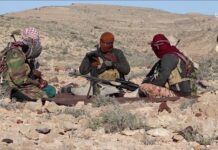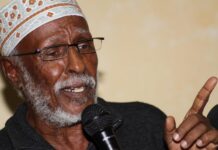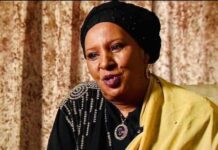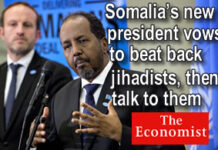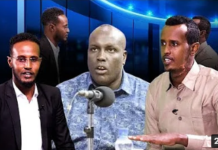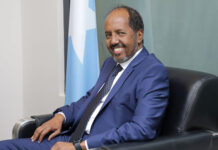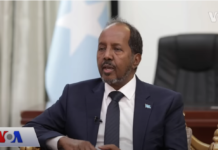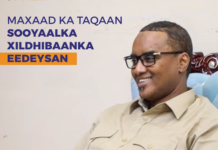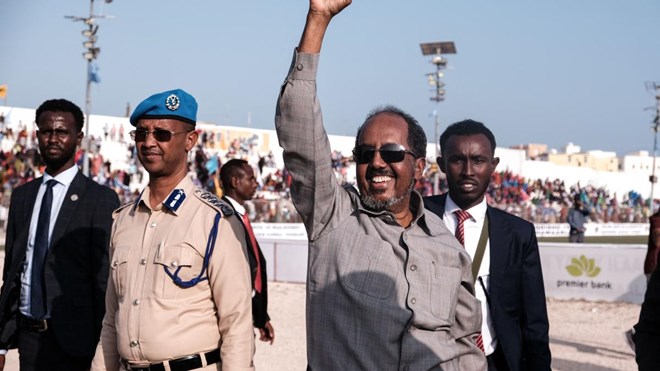 During Hassan Sheikh Mohamud’s first term in office, from 2012 to 2017, the jihadist group failed to assassinate him three times.
During Hassan Sheikh Mohamud’s first term in office, from 2012 to 2017, the jihadist group failed to assassinate him three times.
On the first occasion they tried to blow him up at a hotel two days after he was elected. Later the group ambushed his convoy as he drove to a port south of the capital, Mogadishu. After that, gunmen raided the presidential palace while he was inside, blasting through its gates with car bombs.
Rather than the usual phalanx of heavily armed soldiers, his security detail at the hotel was surprisingly light: a few stern men with earpieces, who frisked visitors at the entrance to his room. Inside, reclining in an armchair, Mohamud casually reeled off the attempts on his life while sharply-dressed aides handed him notes scribbled on bits of paper.
Since becoming Somalia’s president for a second time in May he has declared “total war” on the jihadists. He believes he can finally end the seemingly chronic insecurity that has dogged Somalia for years and rendered much of Mogadishu a maze of blast walls and razor-wire checkpoints.
A central plank of this “total war” strategy has been nurturing a recent series of rural uprisings against al-Shabaab by Somali clans fed up with the jihadists’ oppressive rule.
These started last summer in the Hiran area of central Somalia, when members of the Hawadle clan took up arms against al-Shabaab, who were levying extortionate taxes on communities struggling to cope with the worst drought on record. Similar grassroots revolts have since spread to other areas.
Sensing an opportunity, Mohamud’s government moved quickly to support the movements, backing clan militias called the Ma awisley with ammunition, transport and medical evacuations, while relying on them for intelligence. The US, meanwhile, has pitched in with drone strikes.
The approach has drawn parallels with Iraq’s tribal uprisings in 2006-2007 during which armed local groups shook off jihadist rule with American military help.
Some fear that Mohamud’s empowering of clan militias could open the door to future instability, especially if they start fighting among themselves after the jihadists are gone. Mohamud and his advisers reject this idea, saying the militia movement is fully controlled by the national army.
The army itself, however, is plagued by factionalism and corruption. Disputes between its different branches, as well as the police, often turn violent. The latest clash occurred on Saturday when two units fought at a road crossing in Mogadishu.
Mohamud also denies claims his government has handed weapons to the clans. “Somalia’s government does not provide weapons to the people. In rural Somalia, everybody has his own gun … we are reinforcing each other.”
So far, the “total war” approach appears to be working. Several major towns and roads are back under government control. Mohamud said his government will announce the eviction of the jihadists from the central states of Hirshabelle and Galmudug “in a couple of weeks”. After that, the focus will be on forcing the jihadists from their remaining strongholds in the south.
“We are pursuing them, we are after them,” Mohamud said, adding: “In most of the villages, almost all, where even less than 50 people live, they are not there anymore.”
At the same time, Mohamud has stepped up efforts to counter al-Shabaab’s jihadist message, in recognition that “once we defeat them militarily the ideology will remain”
He has appointed a former deputy leader of al-Shabaab – once the subject of a $5 million US bounty – as his religious affairs minister, and last month he gathered together a group of 300 clerics, who issued a fatwa against the group.
Another part of Mohamud’s “total war” is going after the jihadists’ finances. In 2020 researchers estimated al-Shabaab raised at least £ll million a month – more than the federal government did – mostly through violent extortion of businessmen and even civil servants.
All this signals a break from the approach of previous administrations, including his, that failed to tap into the knowledge of local people, he said. “We’ve been fighting al-Shabaab for 15 years, and this war was going on at different levels at different times,” Mohamud said. “In the past, it was mainly with ideas generated from outside Somalia, and it was only based on two principles. One was to degrade al-Shabaab. The other was to contain al-Shabaab so they should not spill over to the rest of the world. Both strategies had one common factor … both were using only military means.”
By contrast, Mohamud is keen to emphasise that his new approach rests on “mobilising the people”. He said: “This is the new thing, that we took the war [against] Shabab to the lowest level, to the people.”
The approach, Mohamud claims, has left al-Shabaab resembling “a fish run short of water”, unable to hide within the population, or impose its taxes on them.
Mohamud’s gains against al-Shabaab come as the African Union’s peacekeeping mission of 18,500 troops prepares to hand over to Somalia’s national army before withdrawing by the end of 2024. The African Union has spent 15 years in Somalia after arriving in 2007, but is now running low on the funding required to remain in the country.
It is unclear whether the army or the national security services will be ready in time.
The most recent clash between army units came two years after police fired at Mohamud’s hotel while he was campaigning for the presidency as an opposition candidate. The election was marred by violence after Mohamud’s predecessor; Mohamed Abdullahi Mohamed, tried to unconstitutionally extend his term, with politicians using the security services for their own ends.
Mohamud has pledged to end this “politicisation” of the security services while ramping up army recruitment before taking over from the peacekeepers. He has also proposed negotiating with al-Shabaab leaders and forgiving repentant hadists from the lower ranks.

